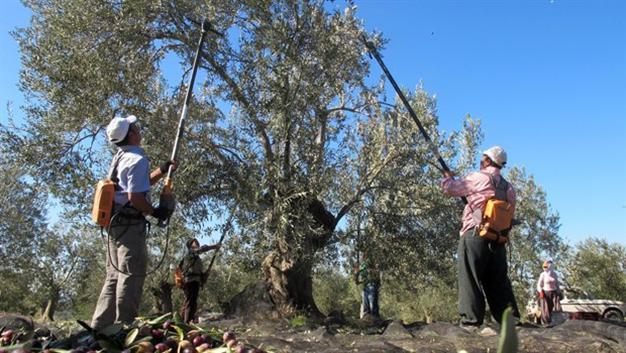Turkish olive producers rise up against draft bill allowing energy investments in their groves
ISTANBUL

The new bill also states that olive groves smaller than 2.5 hectares will not be considered as such, while producers say that the average size of an olive field in Turkey is 1 hectare.
Turkish olive producers have launched petitions against a legislation that if approved will allow for energy firms to invest in their groves.According to the draft bill recently submitted to Parliament, the law will permit private investors to build energy facilities, including plants that run on fossil fuels, military defense facilities and any form of construction in centuries-old olive groves.
Producers condemn the law, stating that it is a “death sentence” for the olive groves, which are an important source of income for olive producers in western Turkey.
The current regulation only allows for the construction of renewable energy facilities that are more than three kilometers from the olive groves.
The new bill also states that olive groves smaller than 2.5 hectares will not be considered as such, while producers say that the average size of an olive field in Turkey is 0.1 hectare.
“This means that the olive groves will be turned into parcels of land. In EU countries, which provide up to 70 percent of global olive production, any field over 1 hectare is considered an olive grove,” said the petition prepared by the olive producers.
Producer Murat Narin also stressed that such a law will be contrary to the Turkish Constitution and many international conventions.
The head of the Turkish of Agricultural Chambers (TZOB), Şemsi Bayraktar, has stressed that the law will negatively affect the Turkish economy and the environment in these areas.
“The yield of the soil in the olive groves where such energy investments will be carried out will not only diminish the quality of the soil, the area will also be more prone to erosion. If we consider that at least one century is needed for the formation of one centimeter of soil, it will be inevitable that the law will cause irreparable damage,” Bayraktar said.
Direct instruction from Prime Ministry
Sources from the olive oil sector attributed the government’s rush to pass the bill to the fact that coal extracted from the Yatağan plant is beginning to decrease.
They claim that the Prime Ministry has directly instructed both Energy and Agriculture Ministries to speed up the legal process so they may extract coal from the nearby olive groves in order to “avoid a gap in energy production.”
Due to the pressure, the Agriculture Ministry has stepped back and will not intervene to halt the law, sources said.
While most of the producers were expecting the law to be voted on following Parliament’s recess, the government has accelerated its effort push the bill through by the end of the parliamentary year.
The bill had been suspended four times during discussions at parliamentary commissions. A separate bill that enabled mining exploration in olive fields was canceled by the Council of State last year.
The government is under fire for continuous legal and bureaucratic efforts to by-pass environmental hurdles in its pursuit of energy investments.
















